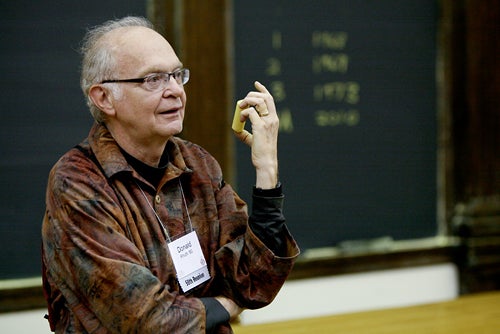
Donald E. Knuth
Professor Emeritus of The Art of Computer Programming
Stanford University
Abstract: The speaker will answer any question on any subject.
Mustafa Korkmaz, PhD candidate
David R. Cheriton School of Computer Science
Data centers consume significant amounts of energy and consumption is growing each year. Alongside efforts in the hardware domain, there are some mechanisms in the software domain to reduce energy consumption. One of these mechanisms is dynamic voltage and frequency scaling (DVFS) and modern servers which are equipped with multi-core CPUs.
Vijay Ganesh, ECE
University of Waterloo
Aaron Moss, PhD candidate
David R. Cheriton School of Computer Science
Rafi Shan Turas, Master’s candidate
David R. Cheriton School of Computer Science
Ingrid Daubechies
James B. Duke Professor of Mathematics and Electrical and Computer Engineering, Duke University
2018 University of Waterloo Doctor of Mathematics, honoris causa
This inaugural Distinguished Lecture in Applied Math will be given in DC 1302, with a reception to follow in DC 1301, the Fishbowl.
Antonina Kolokolova, Department of Computer Science
Memorial University of Newfoundland
A unifying theme in complexity theory in the past few years has been the duality between lower bounds and algorithms. Indeed, some of the main recent lower bounds have been proven by developing better algorithms.
Mina Farid, PhD candidate
David R. Cheriton School of Computer Science
RDF has become a prevalent format to represent disparate data that is ingested from heterogeneous sources. However, data often contains errors due to extraction, transformation, and integration problems, leading to missing or contradicting information that propagate to downstream applications.
Ben Armstrong, Master’s candidate
David R. Cheriton School of Computer Science
Carolyn Lamb, PhD candidate
David R. Cheriton School of Computer Science
This thesis is driven by the question of how computers can generate poetry, and how that poetry can be evaluated. We survey existing work on computer-generated poetry and interdisciplinary work on how to evaluate this type of computer-generated creative product.
Anonymization with Differential Privacy • Ben Weggenmann
SAP Security Research
Cristina Tavares, Master’s candidate
David R. Cheriton School of Computer Science
Amira Ghenai, PhD candidate
David R. Cheriton School of Computer Science
Ju Wang, Postdoctoral fellow
David R. Cheriton School of Computer Science
Passive radio frequency identification (RFID) tags are ubiquitous today due to their low cost (a few cents), relatively long communication range (7–11 m), ease of deployment, lack of battery, and small form factor. This talk shows how even hobbyists can transform commodity RFID tags into sensors by physically altering ('hacking') them using COTS sensors and a pair of scissors. Importantly, this requires no change to commercial RFID readers.
Chathura Kankanamge, Master’s candidate
David R. Cheriton School of Computer Science
Kristofer Siy, Graduate student
Combinatorics and Optimization
Ankit Vadehra, Master’s candidate
David R. Cheriton School of Computer Science
Yaron Minsky, Technology Group Head
Jane Street
Trading in financial markets is a data-driven affair, and as such, it requires applications that can efficiently filter, transform and present data to users in real time.
But there's a difficult problem at the heart of building such applications: finding a way of expressing the necessary transformations of the data in a way that is simultaneously easy to understand and efficient to execute over large streams of data.
Woojung Kim, Master’s candidate
David R. Cheriton School of Computer Science
Yaron Minsky, Technology Group Head
Jane Street
Electronic exchanges play an important role in the world’s financial system, acting as focal points where actors from across the world meet to trade with each other.
But building an exchange is a difficult technical challenge, requiring high transaction rates, low, deterministic response times, and serious reliability.
Mohammad Sadoghi
University of California, Davis
Peiyuan Liu, Master’s candidate
David R. Cheriton School of Computer Science
Anna Lubiw
David R. Cheriton School of Computer Science
In this talk I will look at geometric graph representations from the perspective of three issues: the algorithmic complexity of finding a representation; the bit complexity of the representation; and whether there is a morph between any two combinatorially equivalent representations.
Emily Kozlowski
Department of Statistics and Actuarial Science
A flipped classroom moves the traditional lecture component of teaching outside the classroom, so that it can be replaced with active learning during class time.
In this talk, I present a brief overview of flipped classrooms, followed by a discussion of the details of its implementation for two lectures during the Spring 2018 offering of ACTSC 331. Students’ responses to the technique are also provided in the form of data from anonymous post-activity surveys.





